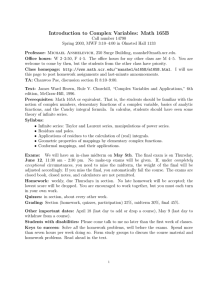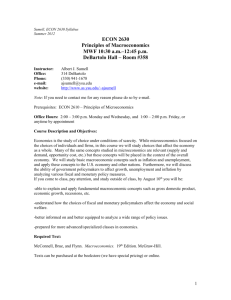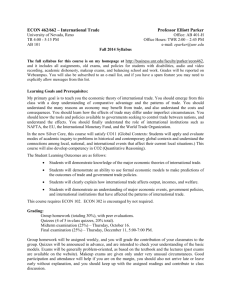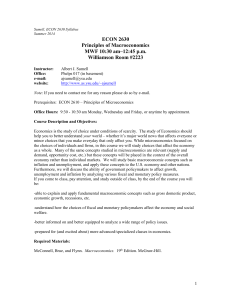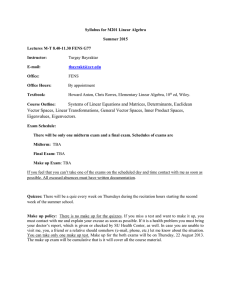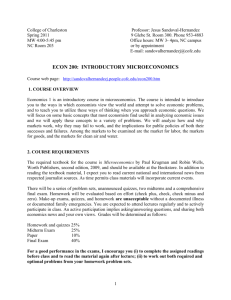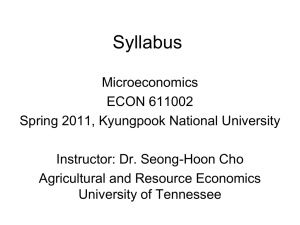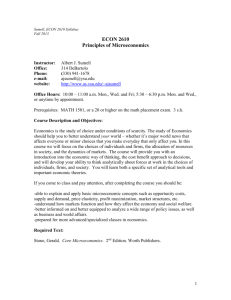Introduction to Microeconomics (Econ 201)
advertisement
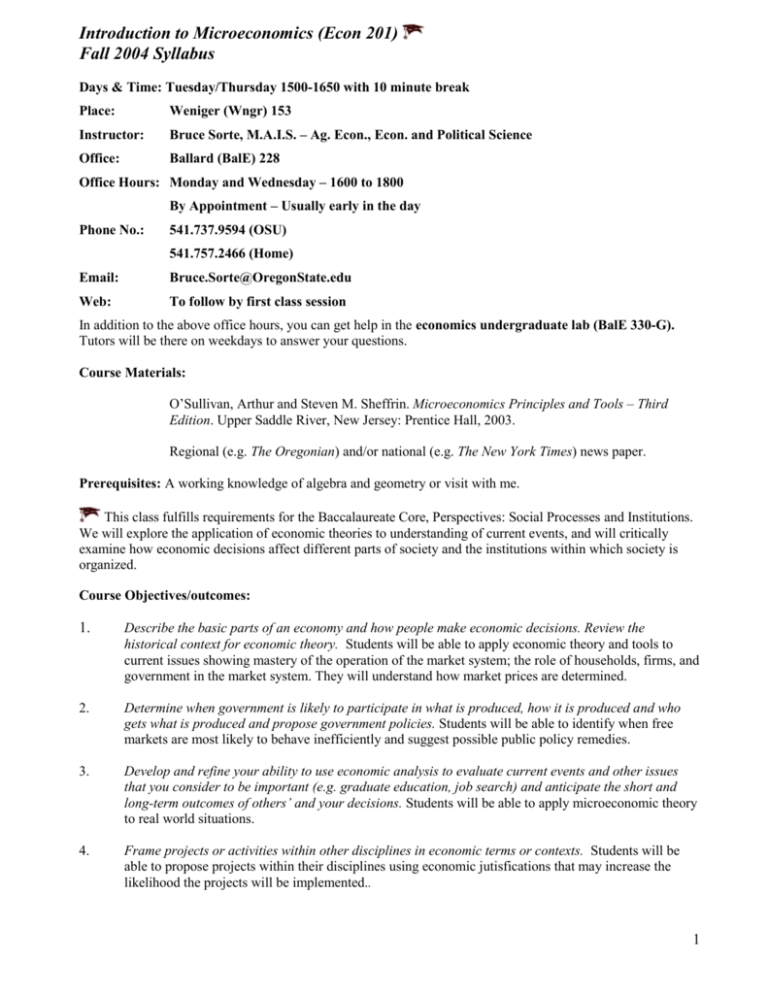
Introduction to Microeconomics (Econ 201) Fall 2004 Syllabus Days & Time: Tuesday/Thursday 1500-1650 with 10 minute break Place: Weniger (Wngr) 153 Instructor: Bruce Sorte, M.A.I.S. – Ag. Econ., Econ. and Political Science Office: Ballard (BalE) 228 Office Hours: Monday and Wednesday – 1600 to 1800 By Appointment – Usually early in the day Phone No.: 541.737.9594 (OSU) 541.757.2466 (Home) Email: Bruce.Sorte@OregonState.edu Web: To follow by first class session In addition to the above office hours, you can get help in the economics undergraduate lab (BalE 330-G). Tutors will be there on weekdays to answer your questions. Course Materials: O’Sullivan, Arthur and Steven M. Sheffrin. Microeconomics Principles and Tools – Third Edition. Upper Saddle River, New Jersey: Prentice Hall, 2003. Regional (e.g. The Oregonian) and/or national (e.g. The New York Times) news paper. Prerequisites: A working knowledge of algebra and geometry or visit with me. This class fulfills requirements for the Baccalaureate Core, Perspectives: Social Processes and Institutions. We will explore the application of economic theories to understanding of current events, and will critically examine how economic decisions affect different parts of society and the institutions within which society is organized. Course Objectives/outcomes: 1. Describe the basic parts of an economy and how people make economic decisions. Review the historical context for economic theory. Students will be able to apply economic theory and tools to current issues showing mastery of the operation of the market system; the role of households, firms, and government in the market system. They will understand how market prices are determined. 2. Determine when government is likely to participate in what is produced, how it is produced and who gets what is produced and propose government policies. Students will be able to identify when free markets are most likely to behave inefficiently and suggest possible public policy remedies. 3. Develop and refine your ability to use economic analysis to evaluate current events and other issues that you consider to be important (e.g. graduate education, job search) and anticipate the short and long-term outcomes of others’ and your decisions. Students will be able to apply microeconomic theory to real world situations. 4. Frame projects or activities within other disciplines in economic terms or contexts. Students will be able to propose projects within their disciplines using economic jutisfications that may increase the likelihood the projects will be implemented.. 1 Grading: Three Homework Assignments(5 ea) Two Unannounced Quizzes(10 ea) Two Midterm Exams(15 ea) Final Exam Class Participation and/or Improvement 15 20 30 35 5 105 I do not raise or lower the curve, however one hundred percent is established for assignments, quizzes and exams using the highest number of points earned by any student in the class. Your final grade is determined by adding all your points and dividing by the sum of the maximum points achieved on each assignment, quiz and exam. 95 - 100% 90 - 95% 87 - 89% 84 - 86% 80 - 83% 77 - 79% 70 - 76% 66 - 69% 60 - 65% less than 60% A AB+ B BC+ C CD F For more information on grading check - http://oregonstate.edu/registrar/grading2.htm Classes will begin each day with a discussion of issues that are in the news so find a few moments to study or at least scan a newspaper before class. Homework assignments will be to analyze current events using the economic theories and methods that we have been discussing. Examinations contain a mixture of multiple choice, short essay and analytical questions. Questions will be taken from the lectures, class discussions, the required readings, additional readings handed out in class and you will be asked to bring a question for just your test. Following College of Liberal Arts policy, all students will be required to take the final examination and the final will be counted in determining your final grade. Make-Up Exams: There will be no make-ups on homework, quizzes or exams, however each student can drop one homework assignment or one quiz or one midterm. The base number of points can then be different for individual students. Class participation will typically not be used to determine your grade yet I reserve that component for cases on the margin. Tips on Efficient Studying : Read the chapter before we cover it in class, at least read the first and last sentence of the paragraphs and scan the graphs. Try to do some of the problems at the end of the chapter or on the CD before class and finish them as soon as possible, after class. If you cannot answer the questions from the readings or are having difficulties, reread the chapter (or needed portions of it), use the undergraduate teaching lab and/or meet with me. Academic Plagiarism: Plagiarism, fabrication, cheating, or facilitating the academic dishonesty of others is a serious offense and may result in failure on the assignment, exam, in the course, and/or expulsion from the university. Please refer to the OSU Schedule of Classes for more information on academic dishonesty. 2 Classroom Consideration and Behavior: Please turn-off your cell phones and if you use a laptop during class do so in a way (e.g. sitting on the outside) that minimizes the distraction of others. We will begin promptly at 3 p.m., break from 3:55 to 4:05 p.m. and finish at 4:50 p.m. Critical analysis as we explore ideas can be helpful, however as the Dean of Students reminds us: "Behaviors which are disruptive to the learning environment will not be tolerated and will be referred to the Office of the Dean of Students for disciplinary action. Behaviors which create a hostile, offensive, or intimidating environment based on gender, race, ethnicity, color, religion, age, disability, marital status, or sexual orientation will be referred to the Affirmative Action Office." Disabilities: Students with disabilities should tell me during the first week of the term so we can accommodate your needs. Schedule – Homework and Quizzes are not scheduled and will be reasonably spaced amongst the other work. 9/28 & 9/30 Introduction – Principles, Methods and Parts of the Economy – Ch. 1 Economic Thinking - Ch. 2, 10/5 & 10/7 Supply, Demand and Market Equilibrium – Ch. 4 Elasticity – Ch. 5 10/12 & 10/14 Markets and Government in the Global Economy – Ch. 3 Market Efficiency and Government Intervention – Ch. 6 Midterm Exam on 10/14 or 10/19 depending on our progress 10/19 & 10/21 Production and Cost Theory – Ch. 8 10/26 & 10/28 Perfect Competition – Ch. 9 Monopoly – Ch. 10 & 11 11/2 & 11/4 Oligopoly and Strategic Behavior with Game Theory – Ch. 12 Market Power and Public Policy – Parts of Ch. 13 & 14 Midterm Exam on 11/4 or 11/9 depending on our progress 11/9 & 11/11 Spillovers and Information – Parts of Ch. 15, 16, 17 11/16 & 11/18 Labor Market and Economic Challenges – Ch. 18 & 19 11/23 International Trade and Public Policy – Ch. 20 11/25 Thanksgiving Break - Return with the most pressing economic issue for 2005 and predicted outcomes for producers, consumers and government. 11/30 & 12/2 Develop solutions for the most pressing economic issues using economic tools/thinking. FINAL EXAM is on Monday, December 6, 2005 at 1400 in our regular classroom, Weniger 153. Good luck and if you are thinking about majoring in economics and would like to meet about classes and future graduate school or professional opportunities, please let me know. If at any point, you have suggestions about class, please drop by during office hours. I am always open for the “so what difference does this make” or “how does this concept fit” question in class or out-of- class. We have a few open seats and visitors, relatives or outof-town friends, are welcome. Just alert them that space may be a bit tight. Thanks, 3


